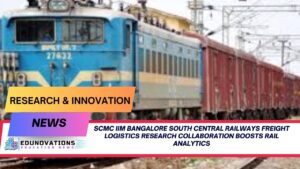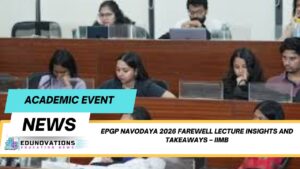Explore key takeaways from International Classical Quantum Optics Conference India 2024. Dive into expert insights, research innovations, and collaboration outcomes.
The International Classical Quantum Optics Conference India 2024 highlights a defining moment in India’s scientific research calendar, bringing together leading minds from around the world in the disciplines of quantum science, photonics, and space optics. Held under the aegis of the Indian Institute of Space Science and Technology (IIST), this event exemplifies India’s growing prowess in futuristic scientific domains.
While the conference drew participation from renowned scientists, the spotlight remained on India’s growing relevance in quantum optics and the classical interplay of light and matter in real-world applications such as satellite communications, quantum computing, and spectroscopy.
Scientific Collaboration Meets Innovation
The conference served as a convergence of theory and application, academic excellence and industry needs. Researchers from institutions across Europe, North America, and Asia presented cutting-edge studies, with keynote speeches from notable figures such as:
- Dr. Gerd Leuchs, Max Planck Institute for the Science of Light
- Prof. R. Simon, Institute of Mathematical Sciences, Chennai
- Dr. Soumyajit Mandal, Case Western Reserve University
Their sessions ranged from quantum entanglement’s practical applications to the integration of photonic technologies in communication satellites.
India’s Role in Quantum Leadership
India is steadily making its mark in the quantum optics research domain. The International Classical Quantum Optics Conference India 2024 highlights the country’s leadership by demonstrating:
- New experiments in nonlinear optical phenomena conducted by IIST and IISc.
- Use of entangled photons in secure communication protocols developed in partnership with ISRO.
- Collaborative research between Indian institutions and MIT, Caltech, and EPFL on quantum photonic circuits.
These findings align with the broader national ambitions under the National Quantum Mission and augment the role of science in space applications.
Toppers Use Mind Maps to score more than 95%
NCERT Class 11th Commerce Mind Maps
Add to cartOriginal price was: ₹999.00.₹199.00Current price is: ₹199.00.NCERT Class 12th Chemistry Mind Maps
Add to cartOriginal price was: ₹199.00.₹75.00Current price is: ₹75.00.NCERT Class 12th Commerce Mind Maps
Add to cartOriginal price was: ₹999.00.₹199.00Current price is: ₹199.00.NCERT Class 12th Science Mind Maps
Add to cartOriginal price was: ₹999.00.₹199.00Current price is: ₹199.00.NCERT Mind Maps For Class 10th
Add to cartOriginal price was: ₹999.00.₹199.00Current price is: ₹199.00.
Purchase Today
Spacepark Kerala and Academic Industry MoU
Parallel to the conference, IIST signed a landmark MoU with Spacepark Kerala to promote academic-industry synergy in satellite photonics, quantum communications, and nano-optics. This initiative marks a significant step toward integrating quantum research into India’s expanding commercial space ecosystem.
The memorandum outlines joint mentorship programs, internships for IIST students, and collaborative research incubation. It also proposes establishing a shared innovation center to simulate quantum experiments in microgravity.
“This is an essential leap for future-ready education and space research in India,” said Dr. K. Sivan, former ISRO Chairman and keynote speaker at the event.
Axiom-4 Mission and IIST’s Bio Payload
During the conference, the IIST team showcased their space biology payload, which successfully flew aboard the Axiom-4 mission. Designed to study plant growth under zero gravity, the experiment aimed to understand seed viability in space—a crucial step toward sustainable life-support systems on extraterrestrial missions.
“The experiment reflects how optical science underpins even biological advancements in space,” commented Dr. Meera Sharma, payload principal investigator from IIST’s Biosciences Division.
Celebrating Students and Innovation
The IIST Student Club Celestia also hosted a parallel series of events, including:
- Sky-watching sessions for school children
- Panel discussions on quantum careers
- A “Build Your Own Interferometer” workshop
- Hackathons on quantum algorithm design
These student-driven initiatives resonated deeply with the larger goal of building India’s future space scientists and innovators.
📌 For students interested in foundational support, explore:
Key Themes and Research Trends
Below are some of the notable themes covered during the event:
- Quantum metrology: Improving measurement sensitivity using entangled photons
- Photon-matter interactions: Towards better quantum dot lasers
- Hybrid systems: Integrating cold atoms and optical cavities
- AI in optics: Using machine learning for interpreting interference patterns
This diversity reflects the interdisciplinary nature of the field, merging optics with biology, chemistry, and artificial intelligence.
External Recognition and Future Pathways
The conference received coverage in leading science journals and platforms such as Nature India and Physics Today. International academic portals have praised the initiative as a benchmark for emerging economies investing in quantum infrastructure.
Moreover, the Mart India Infotech team, known for building advanced school and academic websites, acknowledged the seamless digital experience of the event, calling it “a model digital transformation for institutional outreach.”
For academic institutions looking to build similar visibility, visit Mart India Infotech.
Policy Implications and Educational Impact
The Indian government’s focus on quantum technologies as part of its science and innovation roadmap makes such events all the more significant. By providing a platform for global collaboration and indigenous development, IIST is helping to shape India’s national quantum and photonics policy.
Policymakers attending the event have reportedly discussed potential frameworks to integrate conference findings into national curricula, particularly within postgraduate physics and engineering programs.
Students preparing for government exams or academic entrance tests should regularly visit:
FAQs on International Classical Quantum Optics Conference India 2024
- What were the key highlights of the International Classical Quantum Optics Conference India 2024?
The event showcased research on quantum entanglement, photonics in space, and cross-institution collaborations. - Which institute hosted the quantum optics conference in India in 2024?
The Indian Institute of Space Science and Technology (IIST) hosted the event. - Who were some notable speakers at the optics conference 2024 India?
Dr. Gerd Leuchs, Prof. R. Simon, and Dr. Soumyajit Mandal delivered keynote addresses. - What is the significance of India’s role in the optics conference?
India demonstrated leadership through indigenous quantum experiments and international partnerships. - What MoU was signed during the IIST conference 2024?
IIST signed an MoU with Spacepark Kerala for academic-industry collaboration. - Was there any space experiment showcased at the event?
Yes, IIST highlighted a bio-payload flown on Axiom-4 that tested crop seed growth in microgravity. - What role did students play in the IIST optics event 2024?
Student-led workshops, astronomy sessions, and innovation contests were integral parts of the event. - How is the event relevant to current affairs and competitive exams?
It connects to India’s National Quantum Mission and scientific innovation priorities. - Where can I find study resources related to topics discussed in the conference?
Platforms like Edunovations Notes and Mind Maps are helpful. - How can institutions improve their digital presence like IIST?
They can collaborate with experts like Mart India Infotech for website development.














